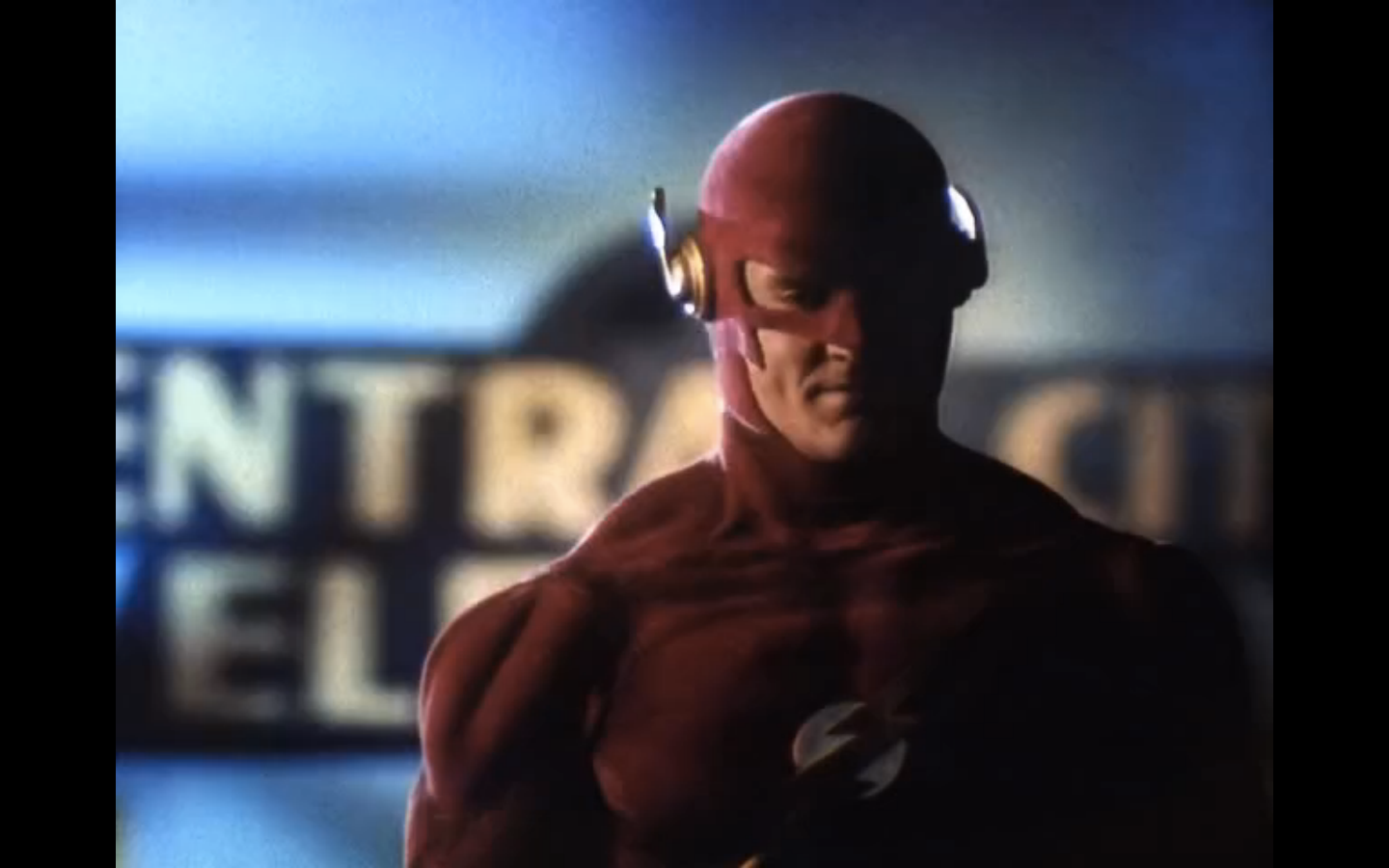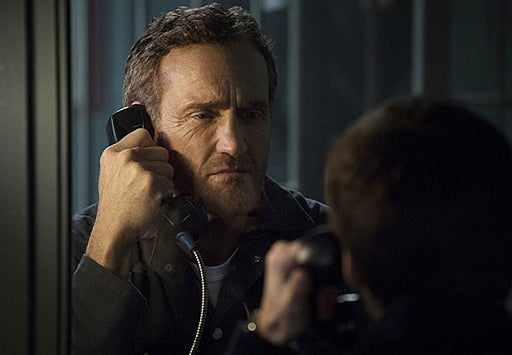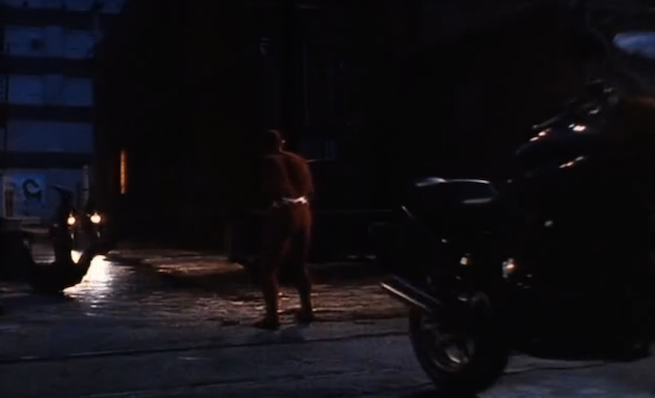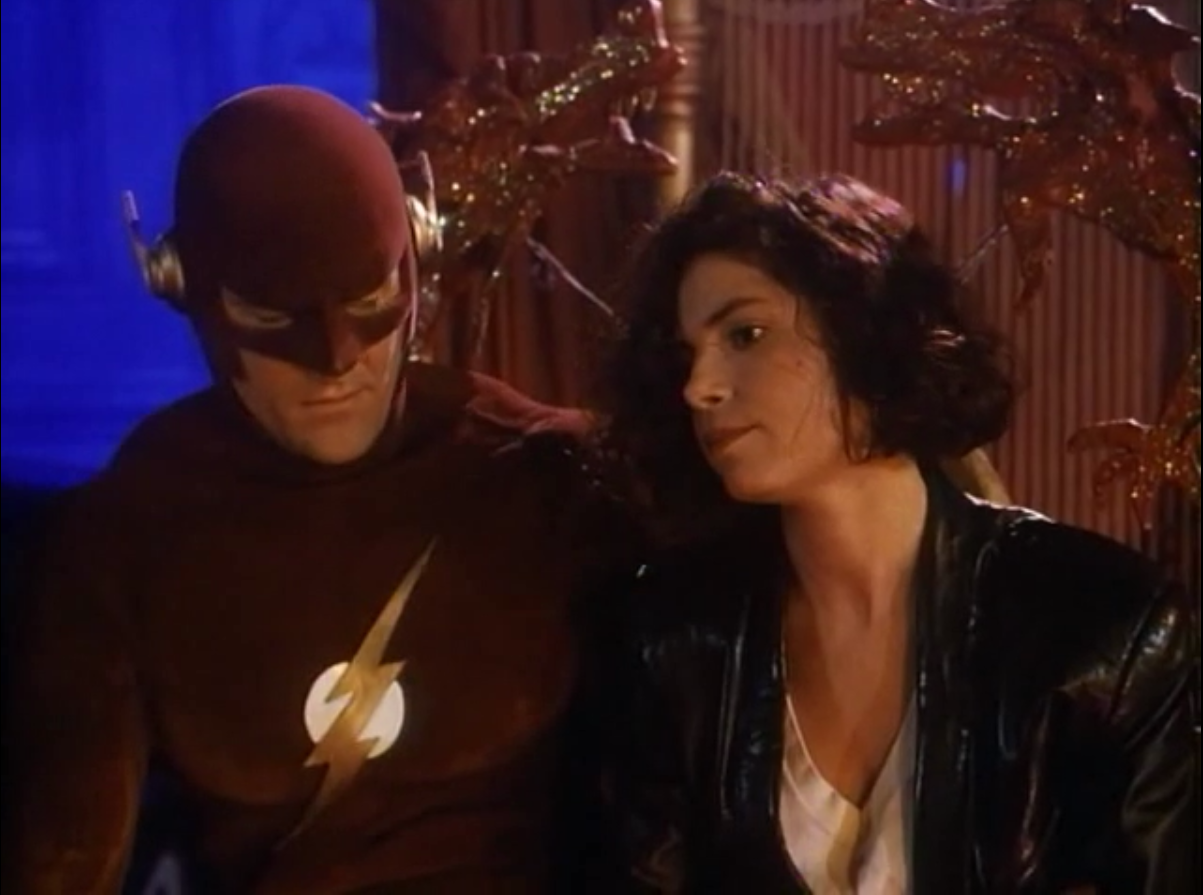Videos by ComicBook.com
“When the subject of playing a superhero came up, I was extremely leery,” Shipp told us. “Because the only idea I had in my mind, since we sort of reinvented how to tell comic book stories for television, everything up to that point that I knew about was very campy and sort of comedic, which is now cool again. In other words, retrospective back to the Batman series of the ’60s now is cool again. In 1990, it wasn’t. It was not where I saw my career going. I had delusions of being a serious actor and I could not imagine running around in a pair of red tights.”
Years later, the series — run by Danny Bilson and Paul DeMeo and featuring a theme by Danny Elfman of Batman and The Simpsons fame — still has its fans, many of whom work on the current version of The Flash for The CW.
So what we’ll be doing in our Throwback Recaps is simple: giving a recap of the episode like we do with the new series, but interjecting comments from Shipp and pieces of interview into the proceedings.
The series pilot was a two-hour TV event, a feature-length episode that has, in fact, seen release as a movie on video and in some theatrical markets.
Before I launch into the recap, I’ll note that you can watch the pilot for free on Amazon Instant Video here.
It opened with a dark, bleak look at Central City, cowed into horrified submission by a violent motorcycle gang who will kill people just for being out on the street when they drive by and who aren’t scared to take pot shots at Police Headquarters.
From there, the episode moves to the home of Henry Allen, the father to Jay and Barry Allen. Henry was a police officer, and while Jay followed in his footsteps, Barry became a lab tech for the department, listening to his mother’s fears about her son putting himself in harm’s way as a cop. In what seems like good-natured ribbing but Barry reads as deep-seated resentment from his father, the old man mocks him regularly for not being a “real” cop. the family disconnect isn’t helped by Barry’s flighty, artist girlfriend Iris, who doesn’t seem to gel with Barry’s loved ones at all. After Barry is paged away, Iris talks to his mother; she’s got a show later in the week. Barry goes off to clean up the scene of the biker gang’s latest shooting, asking Jay to bring Iris and his dog Earl home.
Outside before he goes, Barry gives Jay a unique birthday gift: a medal that his brother had won in high school, and Barry apparently stole as a kid.
At the crime scene, reporters — including Linda Park, who would later be the wife of Kid Flash Wally West — are disappointed to see lab guys instead of “real” cops, too. Barry takes lab assistant Julio Mendez back to the lab to work, but sends him home after Julio dozes off over the microscopes. Barry, working alone in the lab, is struck by lightning and thrown through a shelf of chemicals. Julio returns to find him unconscious, lightning still seeming to course through him.
Barry checks himself out of the hospital, seemingly fine, over the doctors’ objections, but his father is proud of him. That evening, he proposes to Iris but she cuts him off, not wanting commitment.
At the Riders’ headquarters, we find out that their leader, a man called Pike, keeps his gang members under his thumb with cult-like loyalty, and that the consequences are dire for those who don’t buy in.

That night while watching the news, Barry gets a call from S.T.A.R. Labs, who want to see him in person. The scientist in question is Tina McGee, with whom Barry is immediately taken. They start testing his limits, and he blows up a treadmill. After his tests, they go out to eat and Barry consumes a ton of food, realizing that his body is burning calories at a colossal rate and having to replace them. He’s worried that he’s aging prematurely, and McGee thinks she can help him. She insists he keep his identity secret, though, since her husband was killed while experimenting on genetics when government contacts thought he was representing a security risk.
That night, Iris comes over to drop off her keys and Barry cleans the apartment as super-speed…great, except that he’s left melted rubber from his sneakers all over the floor and a wind kicked up in his wake throws freshly-folded newspapers all over the place. His shoes are on fire when Iris comes to the door. She tells him she doesn’t want to see him anymore.
At the Riders’ den, Pike plans an attack on the press release where the Riders Task Force is going to be announced…and it’s revealed that he used to be a cop.
At the lab, Julio has a hair sample he thinks will give them a lead on the Dark Riders. Barry learns that his brother has taken over the task force. That night at the press conference, the Riders attack, injuring the chief of police and rattling the public confidence in the police’s ability to handle the problem.
That night, watching the news, Pike reveals that Jay Allen used to be his partner and was responsible for injuries he sustained that traumatized him and ended his police career.
The next day, Barry is wearing a red “Soviet prototype deep-sea suit,” which should not tatter like normal clothes with super speed. It has a layer of reactive insulation and will regulate his body temperature. Using this, she runs him around a track to test his top speed — which exceeds the speed of sound before he finally stops.
The next night, Jay and his task force are escorting a truck, flanking it to protect its delivery from the Riders.
Back at the lab, Julio’s test results come back and reveal that the hair sample from earlier belonged to Pike. Barry reveals that Pike had a hijacking operation on the side and that Jay had trapped him while he was running a truck full of weapons on the same stretch of road where Jay and company are. Barry is determined to go save his brother, but by the time he gets there, it’s too late and Jay is dead.
When Barry and McGee are examining his injuries, Iris shows up. McGee shows herself out, covering for him by saying that she’s a specialist.
That night, Iris and Barry decide that they should get back together, and that commitment isn’t a necessity. While they’re in bed, though, they realize that their take-out is ready. Barry zooms off at super-speed to get it, coming back too fast for Iris to believe him.
Later, when he goes to stitch his cut up, he has fully healed.
At the police department, Barry begs another cop to let him go interrogate one of the Riders — it’s a woman who had first sold out her boyfriend to Pike, and later been instrumental to his plan succeeding with the truck. She’s also the one who stabbed The Flash. Barry tells Lyla — that woman — that he believes her about The Flash.
While the Riders start planning to break everyone out of jail, Barry uses soil samples to figure out where they are and goes there as The Flash to bust them up. Julio is left wondering what happened. Barry fights off most of the Riders, realizing what their plan is and showing up to thwart it after recovering his brother’s “lucky” medal at Pike’s headquarters.
Barry heads to police headquarters to tell the chief that Pike’s men are going to break their friends out of jail. The chief sends every available man to help, and Barry wants to suit up as The Flash to pitch in as well, even though he’s continuing to have problems with his powers. He passes out, calling for Tina as he does so.
Later, the Riders are attacking the jail when the cops surround the building and threaten to storm it to keep them pinned down. It turns into a gunfight between the Riders and the cops, with The Flash showing up to tip the scales in favor of the police — even though he’s occasionally losing his powers and Pike manhandles him a few times as a result. Eventually, after his identity is revealed to Pike, Barry creates a tornado, throwing Pike in the air. As he tries to stop himself from being hurled, Pike grabs a power line and is electrocuted and dies. After that, the gang falls apart fairly fast.
Later, Barry and McGee agree to continue working together and communicate better than they had been. He gives his brothers’ lucky medal to his nephew, telling him a story about how his brother had been an inspiration to Barry in his track days, and that if his nephew ever needs him, he’ll be there in a flash.
Some thoughts…
Shipp admitted that he had reservations about taking the role, as discussed above. The casting director simply told him that he had to read the pilot script, and that his concerns about playing a big, broad, campy role would be put to rest.
So you didn’t want to be in the suit all the time.
Then I talked to Danny and Paul and they said, “Look, you’re not going to be running around in red tights. We’re spending $100,000 to build four suits. Oscar winner Bob Short is doing the suit, it’s going to be a construction, you’ll only ever see pieces of it. It’ll be a blur, it’ll be a shoulder, it’ll be a leg.” Now, as soon as we got on the air, the network was screaming “We want to see the suit, we want to see the suit, we want to see the suit.” And my take was once you’ve seen it, you’ve seen it.
Danny Bilson said to me, “It’s going to be a comic book show for adults. If I get my way, we’ll be getting complaints every week from PTAs across the country that it’s too dark and too edgy.”
Iris was kind of awful in your episode. Is there any kind of weird cognitive dissonance when you watch Grant Gustin and Candice Patton?
Candice Patton said a very interesting thing at The CW upfronts last year when we found out that we were a go. I hadn’t met her; she came to a friend of mine and said, “I’d like to meet John,” and she said to this guy who related it to me, “You know, one thing John didn’t have when he played The Flash was an Iris.” And I thought that showed me that she had watched the first show, first of all, but second of all I thought it was a very smart comment on her part.
Obviously you had the kind of on again/off again thing with Tina but sometimes it felt almost like a buddy cop thing. It was less intimate even when they were playing with the romance.
Well, one thing I kept and I thought, “Okay, if this is the reason they want me, then I’m going to be vocal about what I think are important,” is the relationships, the human connections, the character arcs.
Danny and Paul wanted to make an hour movie a week, self-contained stories. I was always arguing that’s fine, but you’ve got to have people coming back week to week. I was frustrated because there would be a little bit of flirtation between Barry and Tina one week and then it would be gone the next, and they really couldn’t decide.
They had said that one of the reasons, other than Paula and I just being mismatched in that role, I also think that there were a lot of things working against her that were beyond her control. She was just alien to the Allen family, you know? That dinner table scene where they introduced her.
They never really decided, and this was a problem with our show, “okay, the characters start here. This is where we want them to end up at the end of the season and this is how we get them there, relationship-wise.” They never planned that out.
One of the things they’re doing so well on the new Flash is they obviously learned from our mistakes. What they’ve come up with is kind of a hybrid. They can do the superhero special effects, they can do so much more in post, but they understand the importance of deciding what the relationships are and keeping them consistent so that people would tune in this week and say “Will they or won’t they?”
Watching the pilot, I remember even as a kid really loving the bit where you tell the guy, “I know it was probably an unhappy childhood that led to this.” It was obvious that you had so much Batman influence in the pilot, but that scene felt like Christopher Reeve’s Superman films. You guys really did manage to split the difference effectively, I think.
I always felt that my job was to play Barry. That was my job. And to find as much of the human element in Barry that audiences could relate to. I thought the fun for the audiences would be if I could hook them into Barry and they could relate to some of the hapless things he would go through, the situation with the family, when things would backfire.
All of these little things that would make him human, would, as Amanda would say, “take the piss out of Barry,” which makes him a little bit more vulnerable and lets the audience relate to him so that when I went into the suit, the audience went with me.
And then once the Shirley Walker or Danny Elfman theme would start and the lights went down and the suit came on, my job was done. The suit, the lights, the music and the action carried it. Dane Farwell, my stuntman, was as much The Flash as I was, in my opinion.












